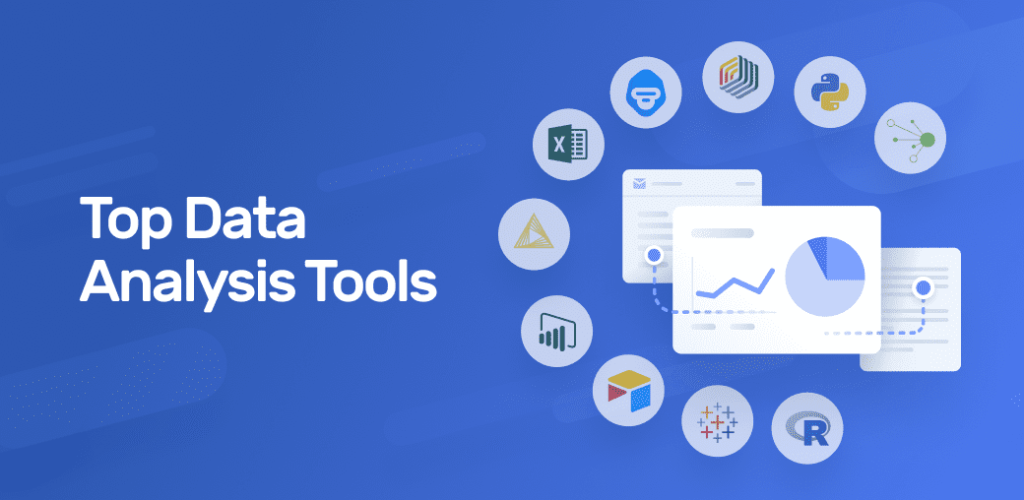Upgrade & Secure Your Future with DevOps, SRE, DevSecOps, MLOps!
We spend hours on Instagram and YouTube and waste money on coffee and fast food, but won’t spend 30 minutes a day learning skills to boost our careers.
Master in DevOps, SRE, DevSecOps & MLOps!
Learn from Guru Rajesh Kumar and double your salary in just one year.

Are you tired of tedious data analysis? Do you feel like you’re drowning in a sea of numbers and statistics? Fear not, because data analytics tools are here to save the day! In this article, we’ll explore the world of data analytics tools and discover which ones are the best for your needs.
What are Data Analytics Tools?
Data analytics tools are software applications that are designed to help you analyze and interpret data. They can be used for a variety of purposes, such as identifying trends, finding patterns, and making predictions. These tools are used by businesses, researchers, and analysts to make informed decisions based on data.
Why Use Data Analytics Tools?
Data analytics tools are essential in today’s fast-paced and data-driven world. They can help businesses gain insights into their customer’s behavior, preferences, and needs. These insights can be used to optimize marketing strategies, improve customer service, and increase sales. Data analytics tools can also help businesses identify inefficiencies in their operations and provide solutions to optimize them.
Moreover, data analytics tools can help businesses make informed decisions. They can provide accurate and reliable data, which can be used to develop strategies and make decisions based on facts rather than assumptions. Data analytics tools can also help businesses stay ahead of their competition by providing insights into emerging trends and market shifts.
Types of Data Analytics Tools

There are several types of data analytics tools. The most common ones are:
Business Intelligence Tools
Business intelligence tools are used to analyze and interpret data to help businesses understand their operations, customers, and markets. They can provide insights into sales trends, customer behavior, and market shifts. Some popular business intelligence tools include Tableau, Power BI, and QlikView.
Data Mining Tools
Data mining tools are used to extract information from large datasets. They can help businesses identify patterns, correlations, and relationships within their data. Some popular data mining tools include RapidMiner, SAS, and KNIME.
Predictive Analytics Tools
Predictive analytics tools are used to forecast future trends and behavior based on historical data. They can help businesses make informed decisions and develop strategies based on future predictions. Some popular predictive analytics tools include IBM SPSS, SAS, and Alteryx.
Text Analytics Tools
Text analytics tools are used to analyze and interpret unstructured data such as emails, social media posts, and customer feedback. They can help businesses gain insights into customer sentiment, preferences, and needs. Some popular text analytics tools include IBM Watson, RapidMiner, and KNIME.
Web Analytics Tools
Web analytics tools are used to analyze and interpret website traffic data. They can help businesses gain insights into website performance, user behavior, and traffic sources. Some popular web analytics tools include Google Analytics, Adobe Analytics, and Webtrends.
Benefits of Using Data Analytics Tools

Using data analytics tools can provide several benefits for businesses. Some of the most significant benefits include:
Improved Decision Making
Data analytics tools can provide accurate and reliable data, which can be used to make informed decisions. They can help businesses identify opportunities, optimize operations, and develop strategies based on facts rather than assumptions.
Increased Efficiency
Data analytics tools can help businesses identify inefficiencies in their operations and provide solutions to optimize them. They can help businesses save time and resources by automating repetitive tasks and processes.
Competitive Advantage
Data analytics tools can help businesses stay ahead of their competition by providing insights into emerging trends and market shifts. They can help businesses identify opportunities and develop strategies to capitalize on them.
Improved Customer Satisfaction
Data analytics tools can help businesses gain insights into their customer’s behavior, preferences, and needs. These insights can be used to optimize marketing strategies, improve customer service, and increase customer satisfaction.
Conclusion
Data analytics tools are essential in today’s fast-paced and data-driven world. They can help businesses gain insights into their customers, optimize their operations, and make informed decisions. There are several types of data analytics tools, including business intelligence, data mining, predictive analytics, text analytics, and web analytics tools. Using data analytics tools can provide several benefits for businesses, including improved decision making, increased efficiency, competitive advantage, and improved customer satisfaction.

 Starting: 1st of Every Month
Starting: 1st of Every Month  +91 8409492687 |
+91 8409492687 |  Contact@DevOpsSchool.com
Contact@DevOpsSchool.com